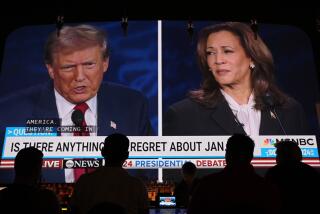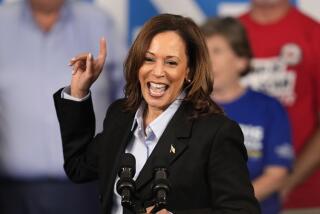Bush, Gore Get 2nd Chance to Impress Viewers
- Share via
WASHINGTON — It’s the liar vs. the lightweight, the embellisher vs. the evader, the tall-tale man against the low-watt bulb.
Such is the caricature the two presidential campaigns are drawing as Al Gore--who’s been accused by the GOP of “compulsive” fibbing--and George W. Bush--who Democrats say doesn’t meet “the Dan Quayle standard” of competence--prepare to meet for their second presidential debate tonight.
With the war of words escalating--and the stakes rising as the polls tighten--both candidates arrive in Winston-Salem, N.C., for tonight’s encounter with something to prove.
Analysts in both parties say that Bush’s sometimes unsteady performance in that first debate did not erase the principal doubt voters hold about him: whether he is ready for the Oval Office. But Gore’s sometimes grating performance--and questionable claims on issues ranging from his visits to Texas to whether he had criticized Bush’s experience--appears to have exacerbated his principal problem with the electorate: doubts about both his likability and trustworthiness.
“The pressure is still on both of them,” says Gary C. Jacobson, a political scientist at UC San Diego. “Bush quieted some doubts, but he’s in a situation where he can raise them again by making some mistakes. And Gore better have his fact checker on hand to avoid any kind of embarrassment like he had in the first debate.”
If anything, the pressure may now be greater on Gore. Although all surveys showed that most Americans believed Gore won the first debate, it is Bush who has gained the most from the showdown. Six national polls released Tuesday show Bush--who trailed in most surveys before the first debate--now holding a narrow 1 to 3 percentage point lead over Gore. A CBS poll gave Gore a 1 percentage point lead.
“We may even have a little bit of momentum for the first time since the convention,” says Tom Cole, chief of staff at the Republican National Committee.
The format for tonight’s debate at Wake Forest University will be less formal than the first. Although they stood behind lecterns at that debate, Bush and Gore will share a table tonight with moderator Jim Lehrer. Bush aides believe the more relaxed setting will favor their man, but its intimacy may make it more difficult for the Texan to challenge Gore’s veracity as sharply as he has on the campaign trail. Both sides are promising a civil tone--though they made similar pledges before their acrimonious session last week. The candidates will meet for a final debate next Tuesday in St. Louis.
The polls’ tilt toward Bush over the last week underscores the debates’ ability to influence public opinion, especially among loosely committed voters, even when viewership is relatively low, as it was for the first Gore-Bush face-off.
Most media analysts and undecided voters interviewed by reporters initially called the debate a draw. But as in the past, the public verdict shifted as the press and voter reactions reinforced each other. Almost all national polls, to varying degrees, show movement toward Bush since the debate.
For Democrats, more ominous than the change in the horse race polls has been the deterioration in Gore’s public image. In that first session, Gore drew positive reviews for his command of facts and aggressive presentation of his case. But he also exhumed doubts about his personality and character that his campaign believed it had buried at the Democratic National Convention.
Gore’s position has eroded on two fronts. Apparently Gore’s relentless style and his audible sighing when Bush spoke grated on many viewers: Polls this week showed that more voters, once again, consider the Texas governor more likable than the vice president. Gore himself recognized the problem. Asked in a Fox News interview Tuesday whether the “sighing and eye-rolling” represented a “major-league mistake,” Gore laughed and answered: “Big time.”
More significantly, the debate has reopened the “honesty gap” between the two contenders, polls show. Earlier this year, Bush generally led Gore when voters were asked which had the honesty and integrity they expected in a president. Gore closed that gap after the Democratic convention, where he reintroduced himself as a family man and “fighter” for “working families.” Even a Republican advertising barrage in early September questioning Gore’s credibility failed to budge those numbers, Cole, the RNC official, acknowledges.
But Gore seems to have done to himself what the Republican criticism could not. The vice president’s questionable assertions at the first debate--even if on relatively minor points such as whether he was traveling with Federal Emergency Management Agency Administrator James Lee Witt when he received a briefing on Texas wildfires--”played into the Republicans’ theme that he can’t be trusted,” noted Jacobson. Two post-debate polls have shown Bush reopening a double-digit lead on trust. Just as significantly, Bush has reestablished a lead in most surveys on the critical measure of which candidate is a stronger leader.
After inflicting these wounds on himself last week, Gore may be in a position similar to Ronald Reagan after his first debate with Walter F. Mondale in 1984. In that encounter, Reagan provoked concerns about his age with a rambling story about driving down the California coast. But in the second debate Reagan deftly defused the issue, telling Mondale: “I will not make age an issue of this campaign. I am not going to exploit, for political purposes, my opponent’s youth and inexperience.”
Gore’s camp promises that he will address the concerns directly. Republicans expect Gore to try to deflect the credibility questions with a Reagan-like turn of self-deprecating humor. But Alan Schroeder, a professor of journalism at Northeastern University who has written a history of presidential debates, says Gore may not be able to joke his way out of trouble as easily as Reagan did.
Most voters, Schroeder notes, had no real concerns about Reagan’s age before that first debate; Gore’s “embellishments” are a longer-standing concern that may be “impossible to correct in one fell swoop.”
Gore’s difficulties have eclipsed discussion of Bush’s performance, but polls suggest that Bush hasn’t entirely resolved his problems with swing voters either. Like other challengers before him, Bush benefited from standing toe-to-toe on the same stage with his better-known opponent. But some of his answers were criticized as tentative and formulaic, such as his response to a question of how he would handle an economic crisis.
“Gore got a negative reaction, but Bush wasn’t able to come back with a positive,” says independent pollster John Zogby.
That’s reflected in the post-debate polls showing Gore still holding a clear lead on questions of competence and preparation. In a Gallup/CNN/USA Today survey released Monday, Gore held an 11-point lead when voters were asked which candidate better understands the issues. In a survey that the Pew Research Center for the People and the Press released Tuesday, Gore held an even more intimidating 18-point advantage when voters were asked whether the candidates were qualified for the job.
Amid the focus on personal characteristics, the differences on issues have received less attention since the debate. But even some key Republicans acknowledge that if Gore can resolve some of the personal doubts he inflamed last week, the pressure on Bush will grow to make a compelling case for change, particularly in economic policy.
Despite the erosion in Gore’s personal ratings, the Pew and CNN/Time surveys showed him still holding a double-digit lead over Bush when voters were asked who could best keep the country prosperous. That Gore strength--combined with continuing optimism about the country’s overall direction--are two reasons why most analysts believe the candidates haven’t seen the last twist in a race where neither has been able to sustain a stable advantage since Labor Day.
*
Times staff writer James Gerstenzang contributed to this story.
More to Read
Get the L.A. Times Politics newsletter
Deeply reported insights into legislation, politics and policy from Sacramento, Washington and beyond. In your inbox twice per week.
You may occasionally receive promotional content from the Los Angeles Times.










